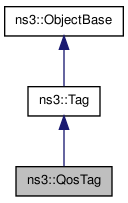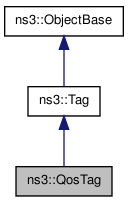#include <qos-tag.h>


Public Member Functions | |
| virtual TypeId | GetInstanceTypeId (void) const |
| QosTag () | |
| QosTag (uint8_t tid) | |
| void | SetTid (uint8_t tid) |
| void | SetUserPriority (UserPriority up) |
| virtual void | Serialize (TagBuffer i) const |
| virtual void | Deserialize (TagBuffer i) |
| virtual uint32_t | GetSerializedSize () const |
| virtual void | Print (std::ostream &os) const |
| uint8_t | GetTid (void) const |
Static Public Member Functions | |
| static TypeId | GetTypeId (void) |
| This method returns the TypeId associated to ns3::QosTag. | |
Detailed Description
The aim of the QosTag is to provide means for an Application to specify the TID which will be used by a QoS-aware WifiMac for a given traffic flow. Note that the current QosTag class was designed to be completely mac/wifi specific without any attempt at being generic.
Constructor & Destructor Documentation
| ns3::QosTag::QosTag | ( | ) |
Create a QosTag with the default TID = 0 (best effort traffic)
| ns3::QosTag::QosTag | ( | uint8_t | tid | ) |
Create a QosTag with the given TID
Member Function Documentation
| virtual void ns3::QosTag::Deserialize | ( | TagBuffer | i | ) | [virtual] |
- Parameters:
-
i the buffer to read data from.
Read the content of the tag from the provided tag buffer. DO NOT attempt to read more bytes than you wrote with Tag::Serialize.
Implements ns3::Tag.
| virtual TypeId ns3::QosTag::GetInstanceTypeId | ( | void | ) | const [virtual] |
- Returns:
- the TypeId associated to the most-derived type of this instance.
This method is typically implemented by ns3::Object::GetInstanceTypeId but some classes which derive from ns3::ObjectBase directly have to implement it themselves.
Implements ns3::ObjectBase.
| virtual uint32_t ns3::QosTag::GetSerializedSize | ( | ) | const [virtual] |
- Returns:
- the number of bytes required to serialize the data of the tag.
This method is typically invoked by Packet::AddPacketTag or Packet::AddByteTag just prior to calling Tag::Serialize.
Implements ns3::Tag.
| static TypeId ns3::QosTag::GetTypeId | ( | void | ) | [static] |
This method returns the TypeId associated to ns3::QosTag.
Attributes defined for this type:
-
tid: The tid that indicates AC which packet belongs
- Set with class: ns3::UintegerValue
- Underlying type: uint8_t 0:255
- Flags: read
No TraceSources defined for this type.
Reimplemented from ns3::Tag.
| virtual void ns3::QosTag::Print | ( | std::ostream & | os | ) | const [virtual] |
- Parameters:
-
os the stream to print to
This method is typically invoked from the Packet::PrintByteTags or Packet::PrintPacketTags methods.
Implements ns3::Tag.
| virtual void ns3::QosTag::Serialize | ( | TagBuffer | i | ) | const [virtual] |
- Parameters:
-
i the buffer to write data into.
Write the content of the tag in the provided tag buffer. DO NOT attempt to write more bytes than you requested with Tag::GetSerializedSize.
Implements ns3::Tag.
| void ns3::QosTag::SetTid | ( | uint8_t | tid | ) |
Set the TID to the given value. This assumes that the application is aware of the QoS support provided by the MAC layer, and is therefore able to set the correct TID.
- Parameters:
-
tid the value of the TID to set
| void ns3::QosTag::SetUserPriority | ( | UserPriority | up | ) |
Set the TID to the value that corresponds to the requested UserPriority. Note that, since the mapping of UserPriority to TID is defined for EDCA only, you should call this method only when EDCA is used. When using HDCA, QosTag(uint8_t tid) should be used instead.
- Parameters:
-
up the requested UserPriority
The documentation for this class was generated from the following files:
- src/devices/wifi/qos-tag.h
- doc/introspected-doxygen.h
 1.7.1
1.7.1